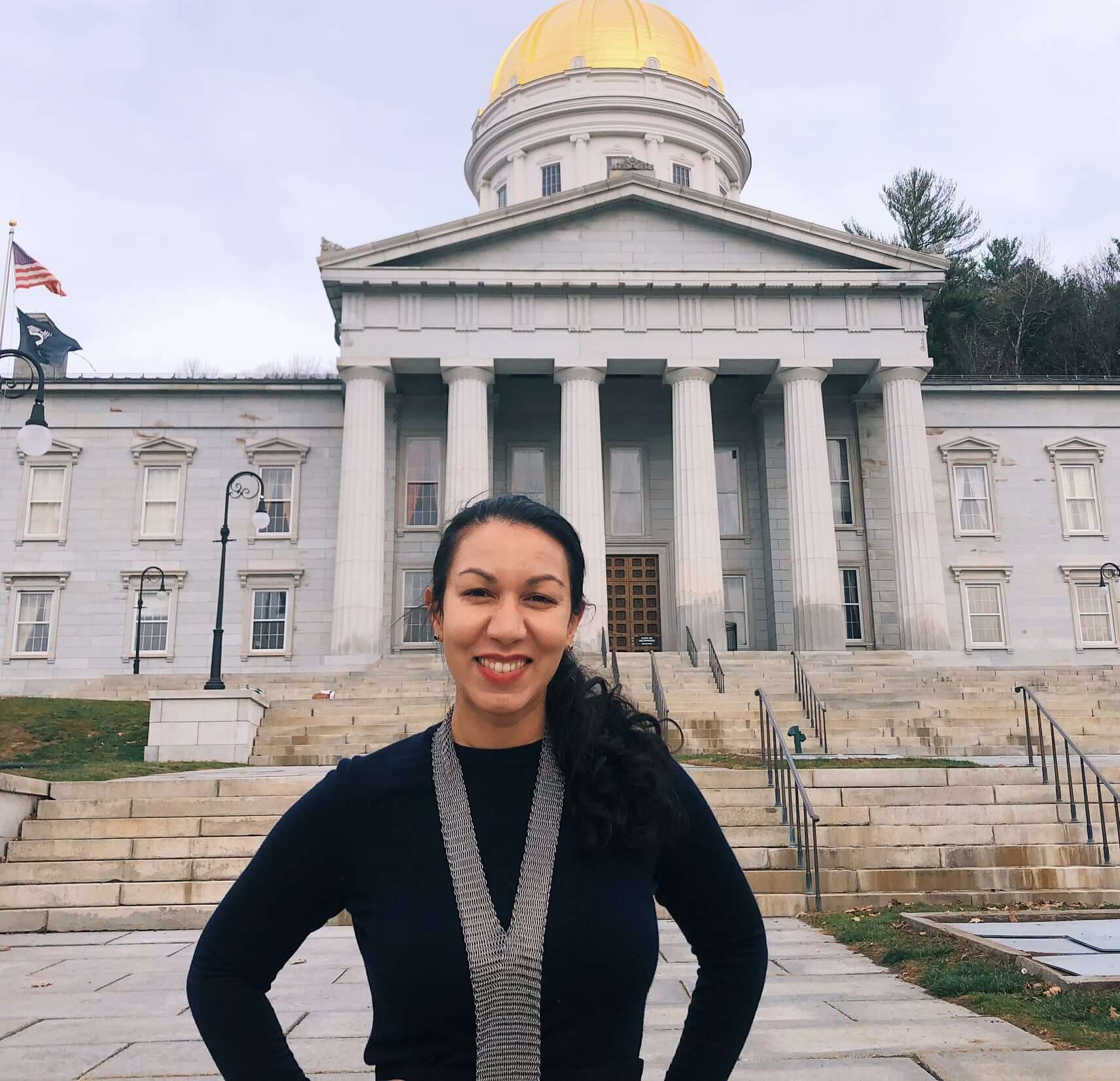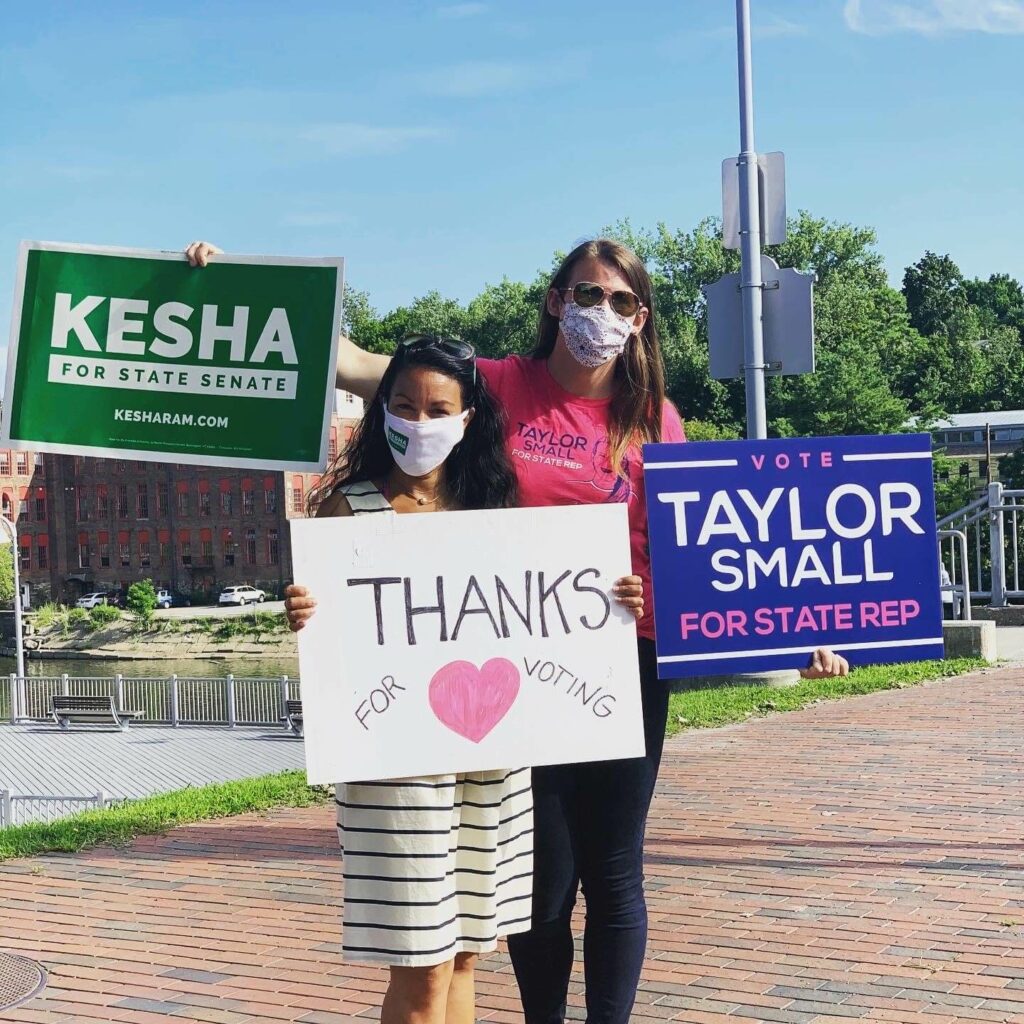This interview originally appeared on The Brown Girls Guide to Politics in a series spotlighting women of color state legislators who navigated the unprecedented influx of racist, anti-democratic, anti-abortion, and anti-transgender legislation introduced in 2021.
What made you fall in love with politics?
Politics shaped my family's journey and where they landed when I came into the world. My father's family fled the partition of India when it became Pakistan. My mother’s family fled the transition of Eastern Europe and the persecution of the Jews. And so, these global political upheavals shaped where their families ended up, and what that meant for their life and potential, and allowed me to access the American Dream.
When I was a child, I became more keenly aware of the ways that economic policy shaped their potential and opportunities. My mother is a Jewish woman, my father is an Indian immigrant. And when they found resources to open an Irish pub in Los Angeles, it came from the Women's Bank of Los Angeles, because there was a policy commitment to women's financial access to capital. When I was younger, and my parents got divorced, being on the free lunch program, I could take the SATs for free and access college. So I became aware over time that good policies were really important things that made my life, and my potential, able to be realized.

And then, when I was a sophomore in college, Bernie Sanders was running for the US Senate for the first time and wanted to have a huge event on campus to encourage young people to vote and kick off his campaign. At the time, he couldn’t draw thousands of people as he can now, so he invited this rockstar—a senator from Illinois, Barack Obama—to come to join him on stage. And the event drew in 7,000 people, which is more than 1% of Vermont’s population. And they said, you know, we don't have any women on stage. My friend was the campus organizer for Bernie and he was like, “I know just the person. She's really not afraid to speak up.” And so I introduced Barack Obama and Bernie Sanders as a sophomore, and Barack Obama in his speech said, “You know what, Bernie, if you don't behave yourself, we're gonna run Kesha for the Senate instead of you.” And it was the first time anyone encouraged me to run for office. All of a sudden, with a father from India and a mother from Illinois, I saw someone who had a father from Kenya, and a mother from Kansas, who had a story like mine, and I thought, “Oh, I'm not that complicated. I'm not too complicated to be in the political arena.” And it really changed everything for me.
Was this the moment you decided to run for office?
There was more to it. I went to Washington, DC, worked for Dianne Feinstein for a summer, came back to school, and ran for student body president. And all of a sudden, I was on people's radar, because when you're University of Vermont student body president, you often represent more people than a state legislator does in Vermont.
My friend, Rachel Weston, who had been the Graduate Student Senate President, had become a legislator at 26 and she kept encouraging me to run. She explained the mechanics of it to me and she had been mentored by Governor Madeleine Kunin.
It was women who gave me that real sense that it was possible. It's easier for men, even Barack Obama, who I love, to tell me, “You should run for office, go for it,” but I had a lot of women in my life who said, “These are the roadblocks you're going to hit and we're here to help you get over them.”
A record number of statehouses passed laws attacking abortion, democracy, and LGBTQ+ rights this year—but Vermont was an outlier. What piece of legislation are you most proud of passing?
One of the things that I'm most proud of is banning the suspension and expulsion of small children from school. I had introduced similar legislation in 2014, that banned expulsion of children under eight and I was almost laughed out of the building. The unions wouldn't support it and everyone was saying this is pretty much impossible to change.
But this year, when introducing a ban on expulsion for young children, I had legislative colleagues who said, “Let's add suspension. Why are we suspending six- and seven-year-olds?” So what happened between 2014 and now? I haven't changed what I fight for. I'm doing the same things I was then, but I was a troublemaker and kind of an outlier. And now there are coalitions built around the state. There's a racial reckoning happening in the country. And all I say to people is I haven't changed, the culture of accountability has changed, and we can't let it change back.
Tell us about banning the "LGBTQ+ Panic Defense" in Vermont.
One of my closest friends and someone who inspires me every day in the legislature is Rep. Taylor Small, who is the first openly trans woman to serve in the legislature. I want to give her full credit for working with other members of the House to introduce and advance this legislation.
Vermont is a very LGBTQ-friendly state as compared to most other states, but Taylor faces dangers here. When we would do “honk and waves” together, that was the only time I felt unsafe—and I’m the first woman of color in the State Senate! When I was with Taylor, we would have things shouted at us. I thought people were going to throw things out the window, people would circle back around to yell. So as a trans woman, Taylor faced danger to run for office and continues to face people talking about very intimate parts of her life publicly, and they feel licensed to do that because she is an openly trans woman who is not afraid to have a legislative battle.
The Senate Judiciary Committee almost didn’t hear from Taylor and it felt really important that, before they make a decision or propose any amendments to the bill, they needed to talk to the one legislator in our statehouse who has the lived experience to be personally affected by this legislation. I know how common sense that feels as a person of color and how often that doesn’t happen.
Vermont is also leading on reproductive freedom by advancing Proposition 5, a proposed state constitutional amendment that would guarantee reproductive liberty.
I think it's just as important that we passed an apology for the eugenics movement this year. We apologized for the state's role in the forced sterilization of many Vermonters— mostly women—in a movement that was intellectually led in Vermont.
And those are two sides of the same coin. If you are going to be able to access your full range of reproductive freedoms and liberties, that means access to abortion, it means access to reproductive care to help you bring a healthy child to term, it means childcare, it means maternal health, so it means making any decision that is right for you both emotionally, socially, and economically.

While many state legislatures have seen an uptick in anti-voter bills since the 2020 election, Vermont expanded voting rights.
This year, we passed S.15, which takes a huge step forward in access to mail-in balloting and convenient voting at home.
One of the other critical steps we took this year is we're starting to allow local municipalities to decide if they want to allow all residents to vote in their elections, like their school board elections and municipal elections, regardless of their citizenship status.
In our capital city and our most multicultural city, about 42% of the kids in the schools come from English-language learning families. And those are families who by and large aren't able to vote in school elections and in local elections that affect their families. They both passed city charters to allow all residents to vote. The Governor vetoed these charters in an unprecedented move and we have an override session where I hope we override his veto. These charters mean just as much to me as the mail-in voting.
A recent report about the underrepresentation of Black women in state legislatures revealed that there are no Black women state legislators in Vermont. How do we help elevate Black women’s voices in state legislatures?
That's a central question in my life.
We just started an organization called the Bright Leadership Institute (BLI) to help BIPOC candidates run for office. It's named after Louvenia Dorsey Bright, the first Black woman and one of two Black women to have served in our legislature. By starting the organization and telling her story, we've got cover page articles about her legacy. Many people didn't even know she existed.
The other Black woman who served in our legislature, Kiah Morris, is still an incredible leader and very involved in politics, and she left the legislature because of racial harassment. And so we're trying to help people understand that it's not just because we're a very white state that Black women are not represented in the Vermont statehouse. They've come to the table, and they've been threatened, harassed, rejected, made to feel less than, and they have taken themselves out of the arena after they've lost a battle to be seen and heard by the communities that they need help and safety from.
I've tried to help white Vermonters understand that saying, “We just need to recruit Black women here,” doesn't mean we've done the work to retain them. Vermont doesn't have a recruitment problem, it has a retention problem. We have had waves of Black communities come to settle here: we've had Buffalo Soldiers, we've had fugitive slaves, we've had waves of Black folks try to make a home here and feel the ever-present racism of “You're not doing it the way we do things here. This is the way Vermont does things.” And that's become shorthand for, “You're not white enough, you don't fit into our culture.” And so we have a lack of diversity not because Black people haven't tried to live here, but because they haven't been able to be part of shaping their communities.
The other thing BLI is focusing on is tapping into these innate skills that already exist in communities of color, particularly among Black women. Black women have organized every important movement in this country. Black women have the skills, the power, and sometimes they just haven't used it in a political campaign way. When you do use it, people realize how powerful you are, and they will challenge you and you need an army of people behind you to back you up when that happens. So often, Black women are left on their own when the really small vocal minority of racist people get really loud, and they're left without support. We need to stop that because that can feel really lonely.
I have my sights set on Black women to join me in the state senate. I relish being the first woman of color, only in so much as I have the responsibility now to turn around and make sure there are also Black women, Indigenous women, and trans women in the state Senate as well.